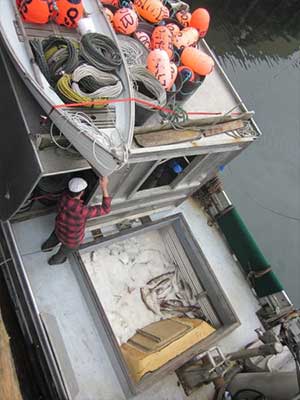
Study investigates shortcoming of ITQ systems for fisheriesBy LAUREN FRISCH
August 24, 2018
“ITQs are being advocated across the board without much reflection on what individual fisheries need,” said College of Fisheries and Ocean Sciences professor Courtney Carothers. “ITQs might work well for some big industrial fisheries, but, for small-scale fisheries, they’ve had lots of negative consequences.” Published in the Proceedings of the National Academy of Sciences, the paper was the result of a workshop that gathered international social scientists to discuss the ITQ panacea—a simple policy solution aimed to uniformly solve complex problems. Researchers in the workshop argued that the worldwide advocacy of ITQs has overlooked their shortcomings in many regional fisheries and discouraged development of equitable alternatives. ITQ systems regulate fisheries access by dividing up total catch limits among individual quota owners. ITQs are largely an economic tool meant to encourage consolidation and efficiency. By limiting the number of quota holders and making quotas a tradable commodity, the value of the quota share has increased greatly, which can make it harder for certain people to opt in. “Social scientists have been frustrated by the assumption that ITQs are a simple solution for fisheries management across the world,” said Carothers. “We were excited to come together and evaluate some examples of where ITQs work, why sometimes they don’t work, and who is being impacted when an ITQ isn’t the right option for a fishery.” One example, Carothers explained, was the privatization of access to the halibut fishery in Alaska. Economists and managers tend to call this “rationalization”. ITQs often increase economic efficiencies. Those who can better profit from fisheries buy out those who profit less. But in the process, many have become excluded from the industry. “Indigenous villages that have long depended on halibut as a supplemental fishery feel they have been ‘rationalized out’ entirely,” Carothers said. “It can be as much as $70 per pound to purchase quota for the halibut fishery, which most people cannot afford. It has been over 20 years since the ITQ fishery was established, and people are still talking about the social disruption.” By now, after so much research on this topic, the economic consequences of ITQ systems are predictable, Carothers said. Also, she said, the perception of ITQs as a panacea has become entrenched, making it hard for people to think about alternative solutions. “We hope this paper will get people to start questioning ITQs as a blanket solution for fisheries managers,” she said. The workshop was hosted by the Institute of Arctic Studies at Dartmouth University and the Stefansson Arctic Institute. Funding for the workshop came from the Evelyn Stefansson Nef Endowment.
On The Web:
Representations of fact and opinions in comments posted are solely those of the individual posters and do not represent the opinions of Sitnews.
|
||||
